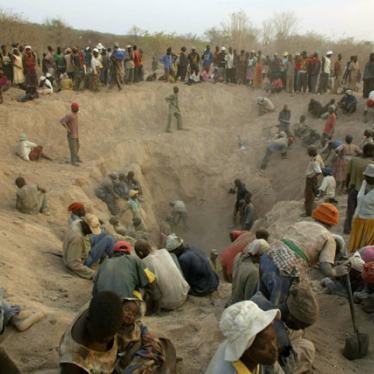Dear Sir:
I am writing to urge your company to publicly commit to not purchase or sell diamonds from Zimbabwe.
Throughout 2009, Human Rights Watch conducted field-based research in the diamond fields of Marange, in eastern Zimbabwe. We found that mining under the supervision of the police and then the military resulted in the use of forced labor of adults and children, killings, and severe beatings. By any reasonable assessment, diamonds from Marange are "blood diamonds," and we are publicly calling upon retailers and interested consumers to boycott Zimbabwe diamonds unless and until the abuses that we uncovered come to an end.
We are also asking the diamond industry to pressure the Kimberley Process Certification Scheme (KPCS), the global group monitoring the diamond trade, to suspend Zimbabwe until diamond mining at Marange meets its minimum standards for membership. The KPCS sent its own review mission to Zimbabwe and confirmed our findings. We believe that it can no longer certify that diamonds from Zimbabwe are mined in compliance with the rules of the KPCS.
Human rights abuses in Marange
In June 2009, Human Rights Watch published a report documenting horrific human rights abuses in the Marange diamond fields by the Zimbabwean military, including forced labor, child labor, the killing of more than 200 people, beatings, smuggling, and corruption.
As recently as late October, 2009, these abuses were ongoing. Human Rights Watch's latest information suggests that the situation in Marange remains largely unchanged. Despite claims that the army was withdrawing, for the most part, the diamond fields remain under firm military control, with smuggling, human rights abuses, and corruption unchecked.
The role of the Kimberley Process
In July 2009, a Kimberley Process investigative mission also found serious human rights abuses and rampant smuggling at the Marange diamond fields. However, the states that make up the Kimberley Process decided not to suspend Zimbabwe from participation, nor ban the export of its diamonds, despite those findings. The weak excuse given was that its mandate only addresses "conflict diamonds," those mined by rebel groups, but not by abusive governments. In this case, the abuses at Marange were committed by Zimbabwe's police and army, rather than rebel groups.
But these abuses are as serious as those that the Kimberley Process was designed to address; relying on a technicality is no comfort for the victims of the abuses. Instead of ignoring human rights abuses, KPCS members, as well as retailers, should classify Marange diamonds as "conflict diamonds."
What the diamond industry can do
Because of the prevalence of smuggling, the lack of transparency within Zimbabwe's diamond industry, insufficient controls at the country's borders with neighboring countries, and weak certification mechanisms, there is no way to guarantee that Marange stones are not being mixed with those produced at Zimbabwe's other two mines. Moreover, once the Marange diamonds leave Zimbabwe, they are intermingled with diamonds from other countries, creating a serious risk that Zimbabwean diamonds extracted in an abusive human rights environment may be sold in the US and elsewhere.
The US diamond industry, including retailers, therefore has an important responsibility to ensure that they do not sell these gems to unwitting customers. As I am sure you're aware, consumers are increasingly concerned about this problem and might be reticent to buy any diamonds unless suppliers guarantee they are not sourcing from Zimbabwe and can demonstrate that they are in full compliance with the requirements of the Kimberley Process.
Some diamond suppliers like Rapaport and Leber Jewelers have told consumers that they will not acquire or sell Marange diamonds. Other retailers should be able to take similar steps, and we urge you to do so as well. In particular we ask you to:
- 1) Publicly state that you will not buy or sell Zimbabwe diamonds as long as human rights violations continue at the Marange diamonds fields;
- 2) Urge your national representatives and the World Diamond Council, which take part in the Kimberley Process, to broaden the definition of conflict diamonds to include diamonds procured by governments as well as rebel groups that commit human rights abuses
- 3) Ensure that your supply chain does not include any Zimbabwe diamonds and ask your suppliers to certify that diamonds are not from Zimbabwe by specifying the controls in place.
- 4) Respond with evidence-based information to consumers who ask about the origin of the diamonds they wish to purchase.
For your reference, I have enclosed a Human Rights Watch report, "Diamonds in the Rough: Human Rights Abuses in the Marange Diamond Fields of Zimbabwe," which provides information about human rights abuses committed at the Marange diamond fields. I have also enclosed the recent comment by Nicky Oppenheimer, chairperson of De Beers, about the situation in Marange. Other materials about Zimbabwe are available on our website at www.hrw.org/en/africa/zimbabwe. Finally, for more information, we are pleased to refer you to the website of the Kimberley Process, http://www.kimberleyprocess.com/.
Thank you for your consideration. I would be most eager to meet with you to discuss these concerns. I look forward to speaking with you.
Sincerely,
Arvind Ganesan
Director, Business and Human Rights Division
Human Rights Watch
Cc
Francesco Trapani, Chief Executive Officer, Bulgari S.p.A.
Emmanuel Perrin, President and Chief Executive Officer, Cartier North America
Arthur E. Reiner, Chairman, President and Chief Executive Officer, Finlay Enterprises, Inc.
Efraim Grinberg, President and Chief Executive Officer; Chairman of the Board of Directors, Movado Group Inc.
Michael J. Kowalski, Chairman and Chief Executive Officer, Tiffany & Co.
Daniel H. Marks, Founder, President, and Chief Executive Officer, Ultra Stores, Inc.
Neal Goldberg, President and Chief Executive Officer, Zale Corporation







